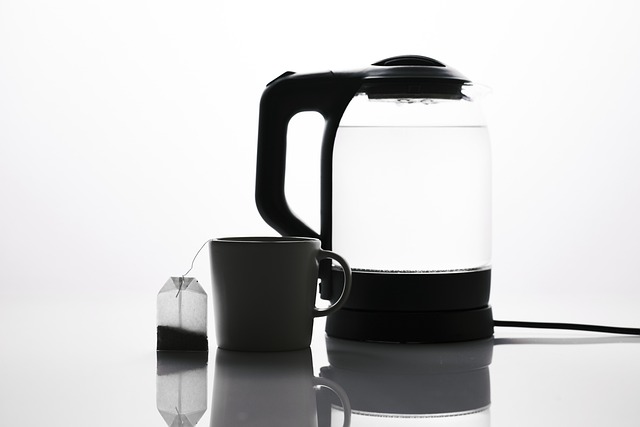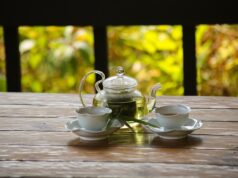Contents
Effortless Cleaning: How to Tackle Stains on Your Stove Top Tea Kettle
Welcome to our guide on effortless cleaning for your stove top tea kettle! Over time, tea kettles can develop stubborn stains that not only look unsightly but can also impact the flavor of your tea. However, with the right techniques and a little bit of effort, you can easily remove these stains and restore the shine to your tea kettle.
Stains on your stove top tea kettle are often caused by mineral deposits that accumulate from the water you use. These deposits, commonly known as limescale or hard water stains, can be particularly challenging to remove. However, with the following steps, you can make the cleaning process a breeze:
Step 1: Gathering the Supplies
Before you get started, make sure you have the necessary supplies. You’ll need white vinegar, baking soda, a soft cloth or sponge, and water. These common household items will be your secret weapons in eliminating stains from your tea kettle.
Step 2: Preparing the Solution
Fill your tea kettle halfway with equal parts of water and white vinegar. The acidity of the vinegar will dissolve the mineral deposits and stains. If your stain is particularly stubborn, you can increase the vinegar concentration. Alternatively, you can also use lemon juice in place of vinegar.
Step 3: Boiling and Soaking
Place the tea kettle on your stove and bring the vinegar-water solution to a boil. Once it reaches boiling point, let it simmer for about 10-15 minutes. The heat and acidity will loosen the stains, making them easier to remove.
Step 4: Scrubbing
After simmering, turn off the heat and carefully pour out the solution. Use a soft cloth or sponge to gently scrub the interior and exterior of the tea kettle. For stubborn stains, create a paste of baking soda and water and apply it to the affected areas before scrubbing. Rinse thoroughly once done.
Step 5: Final Rinse and Drying
Once you’ve removed all the stains, give the tea kettle a final rinse with clean water. Ensure you remove any residue left from the cleaning solution. Dry the kettle thoroughly before using it again to prevent new stains from forming.
Now that you know the effortless way to tackle stains on your stove top tea kettle, you can enjoy a cup of tea without any unsightly stains or residue. Remember to clean your tea kettle regularly to prevent buildup and maintain its longevity!
Effortless Cleaning: How to Tackle Stains on Your Stove Top Tea Kettle
Introduction
Stove top tea kettles are a convenient and timeless method for boiling water. However, over time,
stains and mineral deposits can accumulate on their surfaces, hindering their efficiency and affecting
the taste of your favorite brews. In this blog post, we will share effective techniques to effortlessly
clean your stove top tea kettle and restore its pristine condition. Let’s dive right in!
Materials You’ll Need
- White vinegar
- Baking soda
- Lemon juice
- Dish soap
- Non-abrasive sponge
- Microfiber cloth
Step-by-Step Guide
1. Fill the Kettle with Vinegar
Start by filling your stove top tea kettle with equal parts of water and white vinegar. Make sure the
kettle is about halfway full. The acidity of the vinegar will break down the stains and mineral
deposits.
2. Boil the Mixture
Place the kettle on your stove and bring the vinegar-water mixture to a boil. Let it simmer for about
10-15 minutes to allow the solution to work its magic.
3. Remove from Heat and Cool
Once the water-vinegar mixture has simmered for a sufficient amount of time, carefully remove the kettle
from the heat source. Let it cool down for a few minutes before proceeding to the next step.
4. Scrub the Interior
Dampen a non-abrasive sponge or cloth and scrub the interior of the kettle. The mineral deposits and
stains should come off easily. Rinse the kettle thoroughly with clean water.
5. Create a Baking Soda Paste
In a small bowl, combine baking soda with a bit of water to create a thick paste. Baking soda is a gentle
abrasive and works wonders on stubborn stains.
6. Apply the Baking Soda Paste
Apply the baking soda paste to the exterior of the kettle and any remaining interior stains. Leave it on
for around 10 minutes to allow the paste to penetrate and lift off the stains.
7. Scrub and Rinse
Using a non-abrasive sponge or cloth, gently scrub the kettle’s exterior and interior with the baking
soda paste. Rinse the kettle thoroughly until all residue is removed.
8. Remove Stubborn Stains with Lemon Juice
If you encounter any stubborn stains that didn’t come off with the previous steps, dab some lemon juice
on the affected areas. The acidity of the lemon juice will help dissolve the stains effectively.
9. Wash and Dry the Kettle
Wash the kettle with warm water and dish soap to remove any remaining residue. Rinse it thoroughly and
dry it with a clean microfiber cloth.
Conclusion
By following these simple steps, you can effortlessly tackle stains on your stove top tea kettle and
enjoy fresh-tasting tea or coffee once again. Regular care and cleaning will also prolong the lifespan
of your kettle, ensuring years of brewing satisfaction. Remember to clean your kettle on a periodic
basis to maintain its pristine condition.
Frequently Asked Questions
How to Tackle Stains on Your Stove Top Tea Kettle
Here are some common questions and tips for effortlessly cleaning stains on your stove top tea kettle:
Q: What to do if my tea kettle has stubborn stains on the inside?
A: If your tea kettle has stubborn stains on the inside, you can fill it with a mixture of equal parts water and white vinegar. Let it sit for a few hours or overnight, then scrub the stains gently with a sponge or brush. Rinse thoroughly afterwards.
Q: Is it safe to use abrasive cleaners on my stove top tea kettle?
A: It is generally recommended to avoid using abrasive cleaners on your tea kettle, as they can damage the surface. Instead, consider using non-abrasive cleaning agents or natural solutions like baking soda or lemon juice.
Q: How can I remove mineral deposits from the bottom of my tea kettle?
A: To remove mineral deposits, you can fill the kettle with a solution of equal parts water and lemon juice or vinegar. Bring the mixture to a boil, then let it cool and soak for about an hour. Gently scrub the deposits with a brush, rinse thoroughly, and the kettle should be free of mineral build-up.
Q: Can I use bleach to clean my tea kettle?
A: It is generally not recommended to use bleach on your tea kettle, as it may leave a strong odor or affect the taste of the water when you use it for making tea. Stick to non-toxic and natural cleaning methods for the best results.
Steps to Clean a Stove Top Tea Kettle
Gather the necessary materials
Before you begin cleaning your stove top tea kettle, make sure you have the following materials:
- Warm water
- Mild dish soap
- White vinegar
- Soft cloth
- Soft-bristle brush
1. Empty the kettle
Pour out any remaining water from the kettle and remove any tea leaves or residue.
2. Wash with warm soapy water
Fill the kettle with warm water and add a small amount of mild dish soap. Use a soft cloth or sponge to scrub the interior and exterior of the kettle. Rinse thoroughly.
3. Remove stubborn stains
If there are any stubborn stains or mineral deposits, create a mixture of equal parts white vinegar and water. Fill the kettle with this solution and let it sit for about 10-15 minutes. Then, scrub the stains gently with a soft-bristle brush.
4. Rinse and dry
Empty the vinegar solution from the kettle and rinse it thoroughly with clean water. Dry the kettle with a soft cloth or allow it to air dry.
5. Maintain regular cleaning
To prevent buildup and keep your stove top tea kettle clean, rinse it thoroughly after each use and allow it to dry completely before storing.
For more detailed information on cleaning tea kettles, you can visit the Tea Kettle Wikipedia page.
Effortless Cleaning: How to Tackle Stains on Your Stove Top Tea Kettle
Summary:
- Introduction to cleaning stains on stove top tea kettle
- Understanding the types of stains and their causes
- Preparing the necessary cleaning materials
- Step-by-step guide to removing stains effectively
- Tips and tricks for maintaining a stain-free tea kettle


































